Think about the game called “telephone.” As you may recall, the game is played by one person whispering a message to someone who whispers the perceived message to someone else and so on, down the line. The message announced at the end of the game is, in most cases, radically different from the original. While the primary lesson of the game is to expose the danger of gossip, the lesson can be applied to fact versus fiction as well. When we see or hear something, we sometimes naturally tend to fill in the blanks and create our own stories rather than always adhering to the facts. In business, this behavior of distorting facts vs fiction puts your organization at risk. The optimum approach for making decisions based on facts vs fiction is to have a process.

Observe the Situation, and Identify the Problem
Determine what is driving the need for action, and write a factual statement of the business problem or opportunity. Observe the situation firsthand with as much objectivity as possible. Try to parse any bias and presumptions. Look, listen, and set emotions aside. This is not an easy task. As humans, our instinct is to apply our personal values to the experience of others.
Collect Empirical Data
Gather the facts, including relevant numbers, and record them without interpretation. Be aware that our natural inclination is to create a story that cherry-picks the facts perceived to be relevant and disregard the rest. If the data collection involves interviews, brush up on your interviewing technique to be sure the answers to your questions reflect fact vs fiction and personal reflection
Evaluate the Data Based on Facts
Analyze the data and numbers with an open mind. Identify decision criteria to be used for analysis, categorized by what is required, desired and optional to manage the problem or opportunity. Consider alternative courses of action and the impact on stakeholders. If you find yourself falling into the abyss of resistance to change or fear, it may be time to consult with a trusted partner as a sounding board. Sometimes we need to think out loud before the facts crystallize.
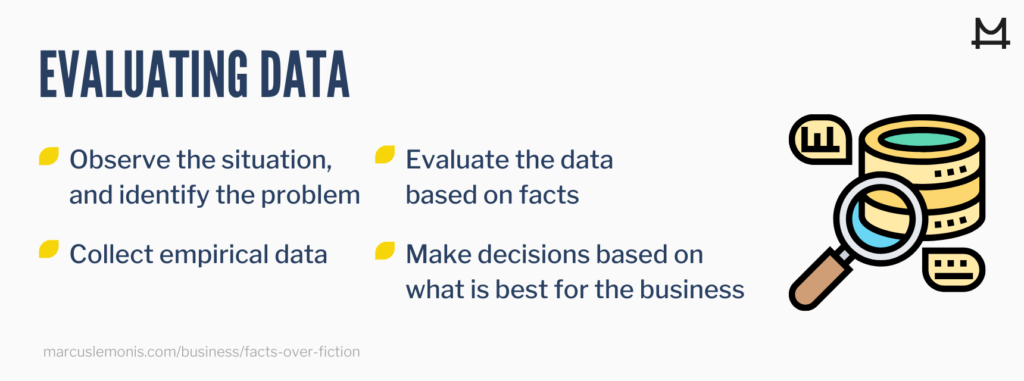
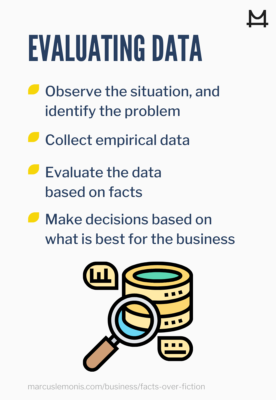
Make Decisions Based on What is Best for the Business
Begin with your mission statement, company values and core business. What you want to avoid is taking the road that feels most comfortable if that veers from the journey you want for your company. Do not allow emotions or opinions to cloud decision making.
Benefits of Fact-Based Decisions
Decisions based on facts, true to the numbers, augment your capacity to assess the situation, deploy action and improve efficiency.
1. Enhances Ability to Evaluate
When you are working from information based on facts, you can evaluate the business need, gaps, known risks and critical success factors. This analysis can help you identify alternative courses of action and determine which decisions align with your organization’s objectives and strategies. Decisions based on facts can be documented, validated and used to build a business case that helps you obtain buy-in from stakeholders.

2. Allows You to Take Action Quickly
Decisions based on facts leave little room for interpretation. This gives you more confidence that you have made the right choice, and this confidence is a gateway toward a successful implementation. Attempting to make a decision based on assumptions can contribute to paralysis by analysis, a term that describes a point where you have over-analyzed the data and are now too paralyzed to move in any direction. When you don’t have the facts, you can get stuck in limbo.
3. Improves the Efficiency of Decision Making
Facts enable you to recognize constraints, assumptions, risk factors and dependencies so you can make decisions backed with contingency plans. It will help you to measure success, set milestones and delegate responsibilities.
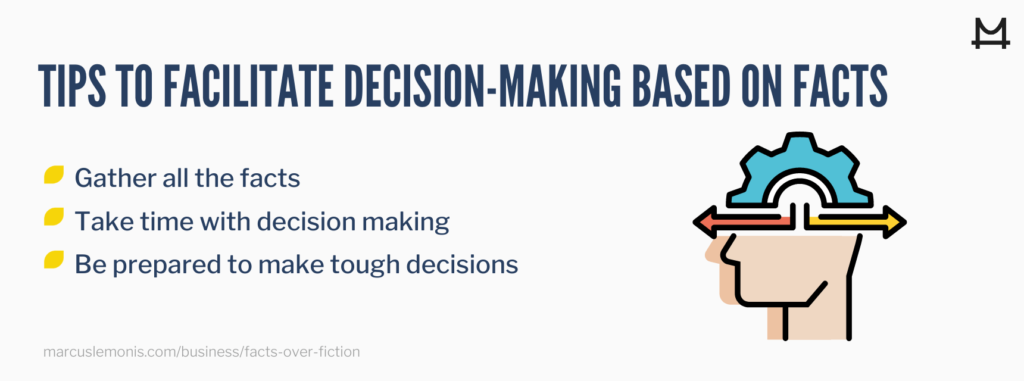
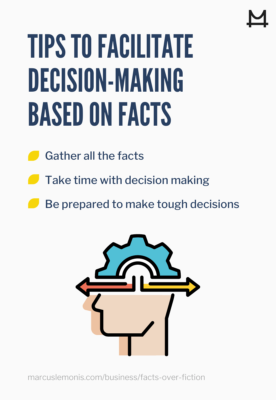
Tips to Facilitate Decision-Making Based on Facts
Build a framework around fact-based decision making to include data gathering, time to deliberate and preparation for challenging decisions.
1. Gather All the Facts
People tend to lean toward expediency when making decisions. Get it done, and move onto the next thing. But by going that route, self-interest can take precedence over what is best for the business. At this stage, your goal is to identify the problem, not place blame, resolve immediately or rush to judgment. Resist the urge to formulate an opinion and analyze the situation at this point. Instead, focus on the truth. Identify the stakeholders, scope and root cause of the problem.

2. Take Time with Decision Making
Investing the time to make an effective decision can pay off in the long-term. At the same time, practice the art of separating fact from fiction to help you draw conclusions based on actual data so you can make productive decisions faster in the future.
3. Be Prepared to Make Tough Decisions
Perhaps you are making a decision about modifying your product line to follow trends. Look at the long-range forecast objectively to see if it makes good business sense. Following the flavor of the month based on a story you are creating for yourself without the numbers to back it up may lead to a decision based on fiction rather than fact. As Marcus has said, “I like trends and fads as a consumer, but not as an investor.”
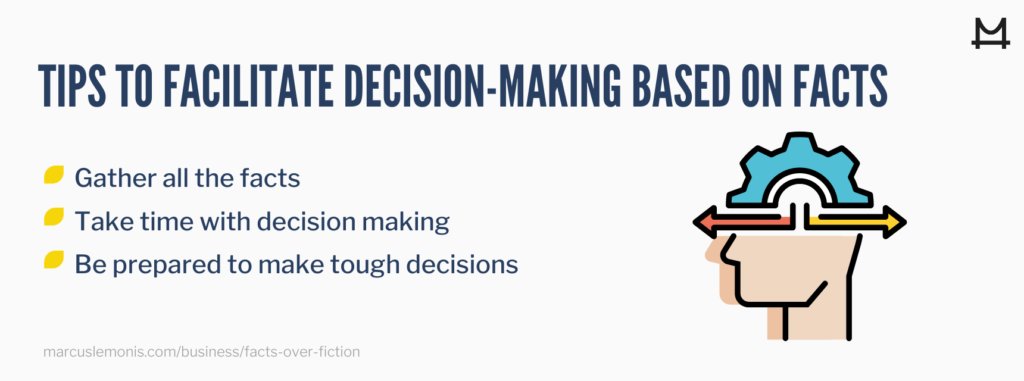
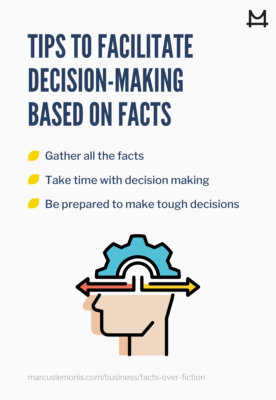
Lessons Learned
Business, just like life, is full of difficult decisions. For all of us, there will be times when we make the right decision and times when we won’t. But the most important thing we can do is be open to information, study the facts, gather data and make the most informed decisions possible for yourself and your business.
- Does your business currently look at the facts before coming to a decision on something?
- Are there any areas in your business that could benefit from facts-based decision making?





